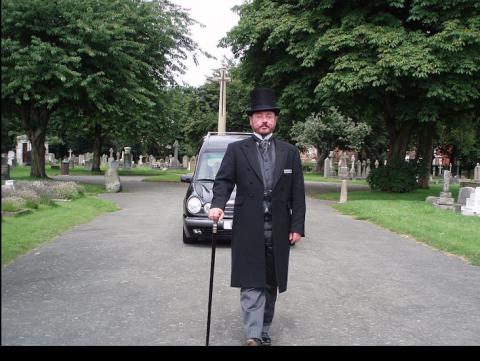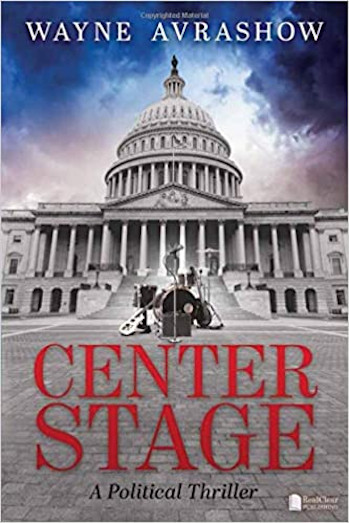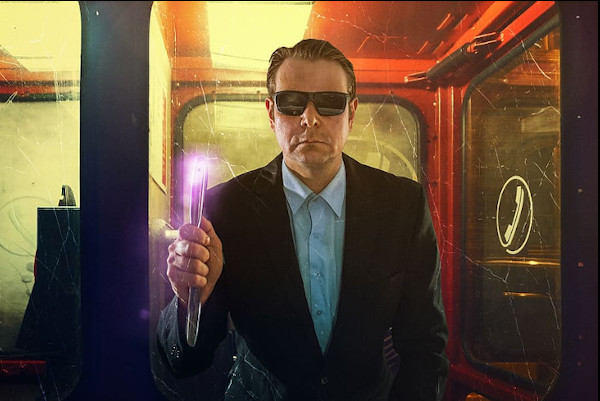New Thriller ‘Center Stage’ Spotlights Political Scandals and Corruption

May 4, Washington D.C.
It was the perfect funeral.
The perfect weather appeared as Washington D.C.’s, rain had ceased, and the sun struggled out from behind gray clouds.
The perfect blend of grief and respect cascaded down the rolling greens of Arlington National Cemetery as the attendees awaited the eulogies that would cite Nevada senator Ted Garvey’s patriotism.
Tyler Sloan arrived after most of the mourners had already been seated, and a standing-room-only crowd had formed. With his arrival unnoticed, he quietly observed his father, Mike, being escorted to his seat. He moved closer to locate a position where he could hold a clear view of the service.
With his plainclothes security aide following close behind, Sloan walked past the numerous Nevada and Washington public officials sitting stiffly on folding chairs. As he proceeded, a synchronized nudging of elbows and whispers mounted in his direction.
“It’s Tyler Sloan.”
“That’s Tyler Sloan.”
“Tyler Sloan? Here? Why?”

The last statement had been louder than the others. Suddenly the mass of cameras and photographers positioned atop a not-so-distant knoll shifted to fix on him. Photographs of former governor Mike Sloan, the vice president, and various senators were “journalistic cool,” but those of Tyler Sloan were “tabloid heat.”
Sloan stood erect, squinting into the modest sunshine. His brown hair was full, tousled, and flecked with the faintest touch of distinguished gray. He had basked in celebrity for decades, from his early days of singing at high school dances to sold-out arenas around the world. No longer merely a star with wall-mounted platinum albums, he was also a global financial mogul.
He was pleased when last month’s People magazine had included him on the list of the “World’s Most Beautiful People” but winced when the article described him as a “charming, middle-aged rogue.” Despite his comfort with the attention, Sloan sought refuge from the piercing gaze of a woman who repeatedly turned in her seat to glance at him. The polite glances eventually morphed into a lingering stare. When she winked at him, he cast his glance away. His eyes fell again on his father.
Sloan appreciated his father’s aura as a political statesman. As a child, he had studiously read every newspaper clipping of his father. That reading had rendered him the only kid in his third-grade class who knew the meaning of the word gravitas. Now he noticed the slight stoop of his father’s shoulders. He had always marveled at his father’s energy, but Garvey’s death was a stark reminder of his father’s mortality; the two men were but a few years apart.
The late senator Garvey and Mike Sloan had served together in the US Congress. Sloan’s childhood memories included sitting at his father’s desk in the congressional chambers while Garvey played card tricks with him, never grasping how Garvey was able to pull the ace of hearts from behind his left ear.
The senator’s death had shaken the nation’s political equation. Nevada was now the Senate’s tipping point. The political buzz was persistent yet uncertain. With the Democrat Garvey in office, the equally divided Senate had allowed the Democratic vice president to cast a deciding vote to break a Senate tie. However, with Garvey’s passing and the upcoming election to fill the now-vacant seat, a Republican victory would equal fifty-one votes and Senate control.

All but one camera returned its focus to the podium when the service began; a single camera remained focused on Sloan. The final eulogy was given by Garvey’s brother, who battled through tears as he shared childhood memories that were usually far removed from the public domain. When the priest concluded the funeral rites, he stood beside the family to witness the twenty-one-gun salute. Garvey’s middle-aged daughter sobbed almost as loud as the shots that rang out.
Sloan dabbed his moist eyes with his handkerchief as the casket holding the deceased senator’s body was lowered into the ground. The instant the casket disappeared, Republican Chris Collins and Democrat William Rogers, whom everyone called Billy, began to “work” the mourners. The two leading contenders for the Senate seat appeared united in false grief, and Sloan bit his lip at their lack of shame.
Collins, a former television news anchor, walked toward Sloan with a quickened pace, discreetly waving as she approached. Her blond hair shone, her skin glowed, and her blue eyes sparkled. Television was her manifest destiny. Critics acknowledged her translucent beauty, but Sloan could peer through her transparent looks into her empty soul.
Collins effusively greeted Sloan, who returned a perfunctory embrace.
“Cherry blossom season is fantastic,” she said with inappropriate glee, gesturing to a nearby tree with her dark sunglasses.
“Can I count on your help? We’ve known each other for a long time.”
“We know each other well—very well,” Sloan replied with a hint of mischief.
“I never…” Collins’s words squeezed out through her tight lips. “I never want to hear that again.”

Billy Rogers dutifully trudged up the small incline toward Sloan. Upon seeing his approach, Collins grazed Sloan’s hand with her own and walked toward the cameras. Her appropriate somber countenance had returned, her dark glasses once again fastened securely over her griefless eyes. Her real political skill was in projecting an illusion of concern.
Despite the increasing wind, Rogers’s slick black hair withstood any movement. His hairline ended in a sharp widow’s peak, the most angular feature on a short, stocky physique that resembled a fire hydrant.
“It’s coming this week,” he said with determination. “There is a rumor the governor might go off the reservation with his appointment. But I’ll get to the Senate, appointment or election.”
Without malice, Sloan privately dismissed Rogers as a mere pedestrian pol. He equated the lieutenant governor’s political skills to those of a casino pit boss—the politician’s former occupation.
In the media-driven political orbit, the mere fact that Rogers “did not look like a senator” was a deep career wound.
“Join Team Billy,” Rogers said quickly. “Sing a song at our Mandalay Bay fundraiser.”
Sloan was well versed in candidate-speak. He translated phrases of “needing your help” and “wanting you on our team” as pleas to open a checkbook or, in his case, to make a strategic public appearance.
“Not now,” Sloan replied tightly, turning away.
This in an excerpt from Wayne Avrashow’s new book, Center Stage: A Political Thriller (RealClear Publishing). Published with permission.
Highbrow Magazine
Image Sources:
--Pxfuel (Creative Commons)
--Pxfuel (Creative Commons)
--Pxhere (Creative Commons)
--Noclip (Wikimedia, Creative Commons)






























































































































































































































































































































